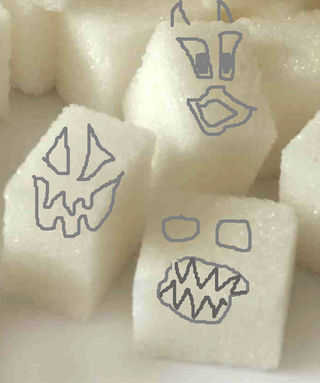
Anxiety
Is There a Blood Sugar Monster Lurking Within You?
Do you get mean or low, and don't know why?
Posted November 14, 2013 Reviewed by Jessica Schrader

Ever know someone who will get into the lousiest mood because they became hungry? And, if they don’t get some food in soon, the brain shuts down and they can become just plain mean? Sometimes they don't know they are hungry until after they eat—when they apologize for their behavior. Are you even one of those people?
Hunger and hypoglycemia (low blood sugar) are primitive signals known to set off the stress response in a person. In people who are predisposed, anxiety and depression can be common segues to this stress response. Triggered by drops and fluctuations in blood sugar, anxiety, and depression can manifest in people who are very sensitive and can become chronic if food intake isn’t consistent.
Humans are built like all the other animals—and animals get very unhappy when blood sugar is low. It is an evolutionary mechanism that is designed to make finding food a priority. This priority is important, for it helps to avoid starvation. But in us humans, low blood sugar can have a very negative effect on mood.
While the primitive animal goes into food-finding mode, sometimes our more complex human brain doesn’t realize it is a food issue, and instead simply feels anxious, depressed, angry, or even all three. That primitive part of us starts to stress about other issues (work, relationships) and the real culprit—low blood sugar—is not addressed. In a panic, sometimes a person who is hungry and stressed out might even go for more sugary foods (like sodas, cookies and cakes) which will cause even greater blood sugar fluctuations and keep the cycle going.
How To Balance Your Blood Sugar
If you know you are one of the people who are affected by drops in blood sugar, it is important to eat regularly throughout the day. And, as much as possible, it is best to pick foods and snacks that have plenty of protein, and minimal amounts of simple carbohydrate foods. Eating simple sugars, especially when you are hungry, can make things worse. Foods with the simple carbs/sugar will spike your blood sugar, which sets off a reaction to activate the hormone insulin. Insulin then tends to drops our blood sugar even lower than when it started, keeping the negative cycle going.
Ideas for Good Blood Sugar Control
- Eat regularly scheduled meals and snacks in between.
- If you tend to have low blood sugar, eat small meals every two to three hours
- Meals should include protein sources: fish, grass-fed meats, eggs, beans, or protein powder in a shake. Beans are a good protein source, for these are complex carbs, where the blood sugar moves into the blood slowly. Meals should also include fat: avocado, nut oils, fish oil, olive oils.
- Snacks ideas: apple or celery with almond butter, raw nut and seed mix with dark chocolate chips and some organic raisins, carrots, and hummus.
- Reduce the amount of simple carbs, such as cakes, cookies, and breads. Keep these as occasional treats instead of everyday staples.
- Consider a chromium supplement, which can help support blood sugar balance.
- Keep up fiber-rich foods. Adequate dietary fiber helps blood sugar remain stable by slowing the entrance of sugar into the bloodstream.
- If the above do not work for you, consider having a blood test called the glucose tolerance test and also a serum insulin test. If these are not balanced, and insulin is high, strategies that help the body become more sensitive to insulin (like building muscle, and more specific ways to eat) might be appropriate for you.
Peter Bongiorno ND, LAc is co-director of Inner Source Health in New York. Learn more about him here.

